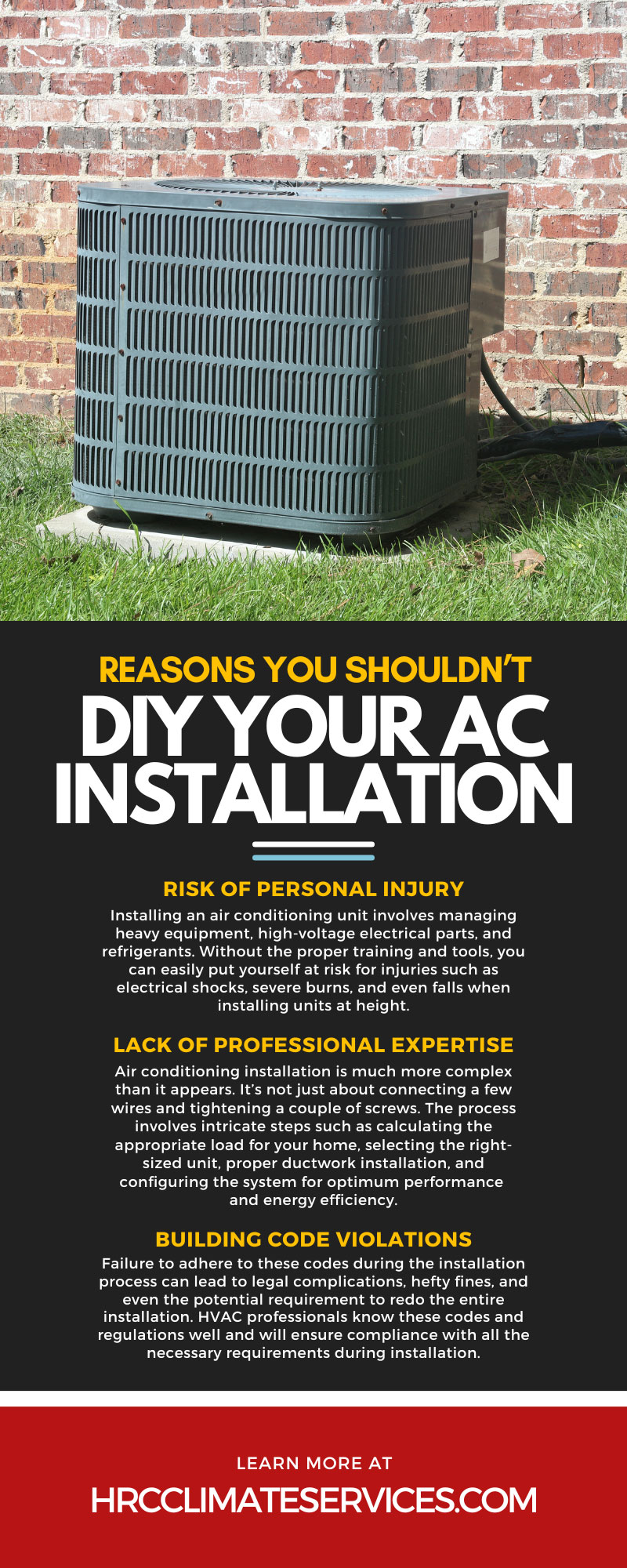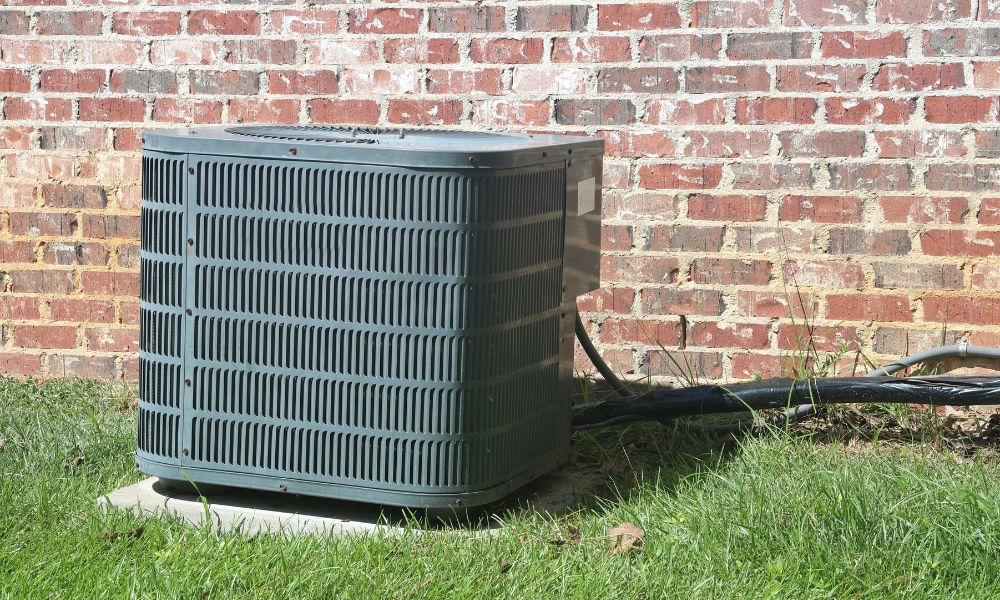The allure of doing various home improvement tasks yourself is often strong. Who doesn’t love the sense of personal satisfaction and accomplishment that comes with a successful project? However, as a homeowner, knowing when to roll up your sleeves and when to call in the professionals is great knowledge to have because it can save you money on costly repairs.
Installing an air conditioner falls into the category of needing professional help. Learn the eight reasons you shouldn’t DIY your AC installation. Take our advice and prioritize your home’s comfort and safety by calling in the professionals.
Risk of Personal Injury
Installing an air conditioning unit involves managing heavy equipment, high-voltage electrical parts, and refrigerants. Without the proper training and tools, you can easily put yourself at risk for injuries such as electrical shocks, severe burns, and even falls when installing units at height.
Moreover, mishandling refrigerants can cause health issues such as skin irritation, eye damage, and respiratory problems. Therefore, it is safer to have professionals who have undergone rigorous training to safely deal with these risks.
Lack of Professional Expertise
Air conditioning installation is much more complex than it appears. It’s not just about connecting a few wires and tightening a couple of screws. The process involves intricate steps such as calculating the appropriate load for your home, selecting the right-sized unit, proper ductwork installation, and configuring the system for optimum performance and energy efficiency.
Each step requires professional knowledge and expertise, which only certified AC servicing professionals possess. Performing these tasks without the necessary skill set can lead to inefficiencies, frequent breakdowns, and even premature system failure. What seems like a cost-saving DIY project can turn into a costly ordeal in the long run.
Building Code Violations
Installing an air conditioning unit isn’t just about connecting several components and making the system work. It’s a process that must comply with local and national building codes. These regulatory codes ensure the safety, health, and overall welfare of the people residing in or using the building.
Failure to adhere to these codes during the installation process can lead to legal complications, hefty fines, and even the potential requirement to redo the entire installation. HVAC professionals know these codes and regulations well and will ensure compliance with all the necessary requirements during installation. Therefore, hiring professionals avoids the risk of unintentional building code violations, providing peace of mind that the installation is successful, correct, and legal.
Potential for Increased Cost
The potential for increased cost due to inefficient system operation is one of the most overlooked outcomes of DIY AC installation. An improperly installed air conditioning unit can lead to higher energy consumption, as the unit struggles to maintain the desired temperature, thus significantly increasing your energy bills.
Additionally, improper installation can result in frequent malfunctions, requiring regular costly repairs that could shorten the unit’s lifespan, necessitating a premature replacement. All these unforeseen costs can quickly add up, making the initial savings from DIY installation insignificant in comparison.
Warranty Violation
Many manufacturers require a professional installation for their warranties to remain valid. This stipulation protects both the consumer and the manufacturer from the potential damage and inefficiency resulting from improper installation.
You might find that the warranty does not cover the damage if you choose to DIY your AC installation and something goes wrong. This lack of coverage can lead to significant out-of-pocket expenses for repairs or replacement.
On the other hand, the HVAC experts you hire to handle the installation usually provide their own warranty on workmanship and preserve the manufacturer’s warranty. This dual protection ensures your investment is secure, emphasizing the importance of professional AC installation.
Improper Sizing
Proper unit sizing is an often overlooked yet critical aspect of AC installation. The air conditioner’s size plays a significant role in its functionality, energy efficiency, and lifespan. A unit that is too small may not cool your home effectively; a unit that’s too large could lead to excessive energy consumption and wear and tear.
Accurately determining the air conditioning unit’s correct size is a complex task involving calculations related to your home’s size, insulation levels, number of windows, and other factors. You cannot accurately complete this task with a simple online calculation.
HVAC experts are proficient in performing these assessments and can accurately determine the optimal unit size required for your home. They ensure you get the most efficient and effective AC unit to meet your cooling needs, thus maximizing the system’s overall performance.
Longevity and Performance
Investing in professional AC installation pays dividends in the unit’s long-term sustainability and performance. HVAC experts provide installation services and offer valuable advice on maintenance and upkeep, which substantially increases the system’s lifespan. A professionally installed unit is less likely to experience frequent breakdowns and maintains consistent performance over time, as it is the correct size and the technicians accurately calibrated and efficiently set it up during installation.
Conversely, a DIY installation may miss critical factors, leading to improper functioning, persistent issues, and, ultimately, a shorter life for your AC unit. Therefore, entrusting the task to HVAC professionals is the prudent choice to ensure longevity, optimal performance, and a better return on your investment.
Poor Indoor Air Quality
The impact an AC installation has on a home’s indoor air quality is a less-known but equally important consideration. An incorrectly installed air conditioning unit can lead to poor indoor air quality, which can have significant health implications.
An improperly installed unit may not regulate humidity levels efficiently or might fail to filter the air adequately. These inefficiencies and failures can lead to the proliferation of mold, bacteria, and other allergens in the system. The unit can then circulate these contaminants throughout your home, triggering allergic reactions, respiratory issues, and other health problems among occupants.
Furthermore, an incorrectly sealed and poorly insulated unit could draw in outdoor pollutants, further degrading the indoor air quality. HVAC experts understand these complexities and can ensure the system promotes clean, healthy indoor air, making another compelling case against DIY AC installation.
The reasons you shouldn’t DIY your AC installation are numerous and compelling. Each factor above bolsters the case for entrusting this task to HVAC experts. While the DIY route might seem appealing initially, the potential risks and downsides far outweigh the potential cost savings. You can ensure your AC installation is correct by hiring professional HVAC experts, saving you from potential trouble down the line. It’s a decision that pays off in terms of your comfort and wallet.




